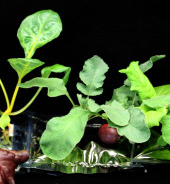What about food grown in space? A recent story revealed that astronauts aboard the International Space Station (ISS) have been dining on red romaine lettuce grown aboard the station. The question occurs to me: were it available to the public, should space-lettuce and other space-grown foods be labeled? It’s obviously not for sale on earth — and likely never will be. NASA wants to figure out how to grow food in space so that it can be eaten during space exploration and colonization. But that doesn’t mean the labelling of space-grown food, sold here on Earth, is not an interesting hypothetical question.
One of the characteristics that tends to make people ask for labelling is when the food is produced in some way that is seen as “unnatural.” It’s hard to imagine anything that fits the bill better than space-grown lettuce:
Each of the six planting “pillows” [seed beds] had a growth medium that includes a type of clay used on baseball fields and controlled-release fertilizer. Red, blue and green LED lights and water injections activated the seeds and allowed them to flourish for 33 days of growth.
Oh, and all of this is done under zero-gravity conditions.
The result? Astronauts reported that the lettuce was somewhat bitter. More information about nutritional composition and microbial activity will have to wait until chemical analysis is completed by NASA scientists back on earth. And if that analysis reveals that space lettuce is fundamentally the same as Earth lettuce? Surely that would obviate the need for labelling, in the very hypothetical case of selling space-grown produce on Earth. Some people would surely still call for labelling — namely, the people who are currently calling for labelling of GMOs. Some such people point out that we “don’t know the long-term effects” of GMOs, because they haven’t been subjected to long-term controlled trials.
Well, the same goes for space food. Such food never will be subjected to long-term controlled trials, either in space or on Earth. But they’ll be tested here on Earth for toxicity and nutritional composition. Stuff that matters. And then astronauts on long missions will eat them, and enjoy them, and be glad of them. How unnatural is that?

